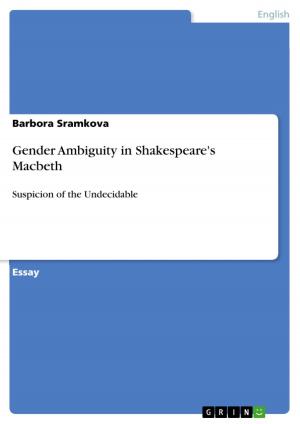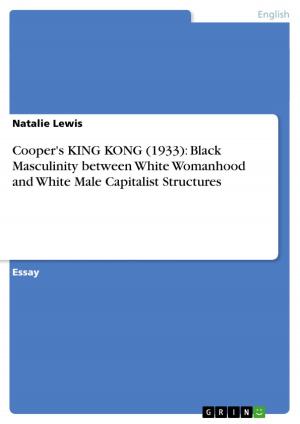Stephen Crane's 'The Red Badge of Courage' as a work of late nineteenth-century American naturalism
Nonfiction, Entertainment, Drama, Anthologies| Author: | Jan-Christoph Allermann | ISBN: | 9783638744119 |
| Publisher: | GRIN Publishing | Publication: | May 8, 2007 |
| Imprint: | GRIN Publishing | Language: | English |
| Author: | Jan-Christoph Allermann |
| ISBN: | 9783638744119 |
| Publisher: | GRIN Publishing |
| Publication: | May 8, 2007 |
| Imprint: | GRIN Publishing |
| Language: | English |
Seminar paper from the year 2006 in the subject American Studies - Literature, grade: 14 Punkte oder 1,3, Saarland University, course: North American War Writing, 11 entries in the bibliography, language: English, abstract: When it comes to American War Writing there are several important writers which come to ones mind. One writer, however, who will most probably always be among them, is Stephen Crane. Although his '[...] contribution to the canon of American literature is fairly slight in bulk: one classic short novel, three vivid stories, and two or three ironic lyrics' , he has achieved something very remarkable. '[...] Crane, who later saw warfare in Cuba and between the Greeks and the Turks in his work as a correspondent, had experienced no fighting when he wrote The Red Badge of Courage.' 'Yet anyone who has gone through warfare, from the time of the novel's publication (1895) until now, has testified to Crane's uncanny accuracy at the representation of battle.' The fact that Crane's imaginative vision is so compatible with real-life experiences of people who have witnessed battle left foremost British and later on American critics in awe and quickly established his reputation as an author. Soon after its publication The Red Badge of Courage became a bestseller. While some people merely enjoy the book as a good read, others have digged deeper into the world of Stephen Crane in order to analyse his masterpiece. Thus it comes as no surprise that there are plenty of academic essays and reviews which deal with The Red Badge of Courage. One thing that is conspicuous throughout these essays and reviews is the ongoing discussion of whether the corresponding literary movement is actually naturalism. 'Stephen Crane's admirers regularly deny he is a naturalist out of what appears to be a fear of linking him with a circle of ´bad` writers.' For a better understanding of their fear one should know that 'American literary naturalism has almost always been viewed with hostility.' But there are also those who state that 'Stephen Crane will always be identified with literary naturalism.' To throw light on the matter I will discuss, in this term paper, whether the novel contains any elements of naturalism. Beforehand I will briefly touch on the origin of naturalism and its evolvement and I will highlight the difficulties in defining the term of literary naturalism.
Seminar paper from the year 2006 in the subject American Studies - Literature, grade: 14 Punkte oder 1,3, Saarland University, course: North American War Writing, 11 entries in the bibliography, language: English, abstract: When it comes to American War Writing there are several important writers which come to ones mind. One writer, however, who will most probably always be among them, is Stephen Crane. Although his '[...] contribution to the canon of American literature is fairly slight in bulk: one classic short novel, three vivid stories, and two or three ironic lyrics' , he has achieved something very remarkable. '[...] Crane, who later saw warfare in Cuba and between the Greeks and the Turks in his work as a correspondent, had experienced no fighting when he wrote The Red Badge of Courage.' 'Yet anyone who has gone through warfare, from the time of the novel's publication (1895) until now, has testified to Crane's uncanny accuracy at the representation of battle.' The fact that Crane's imaginative vision is so compatible with real-life experiences of people who have witnessed battle left foremost British and later on American critics in awe and quickly established his reputation as an author. Soon after its publication The Red Badge of Courage became a bestseller. While some people merely enjoy the book as a good read, others have digged deeper into the world of Stephen Crane in order to analyse his masterpiece. Thus it comes as no surprise that there are plenty of academic essays and reviews which deal with The Red Badge of Courage. One thing that is conspicuous throughout these essays and reviews is the ongoing discussion of whether the corresponding literary movement is actually naturalism. 'Stephen Crane's admirers regularly deny he is a naturalist out of what appears to be a fear of linking him with a circle of ´bad` writers.' For a better understanding of their fear one should know that 'American literary naturalism has almost always been viewed with hostility.' But there are also those who state that 'Stephen Crane will always be identified with literary naturalism.' To throw light on the matter I will discuss, in this term paper, whether the novel contains any elements of naturalism. Beforehand I will briefly touch on the origin of naturalism and its evolvement and I will highlight the difficulties in defining the term of literary naturalism.















